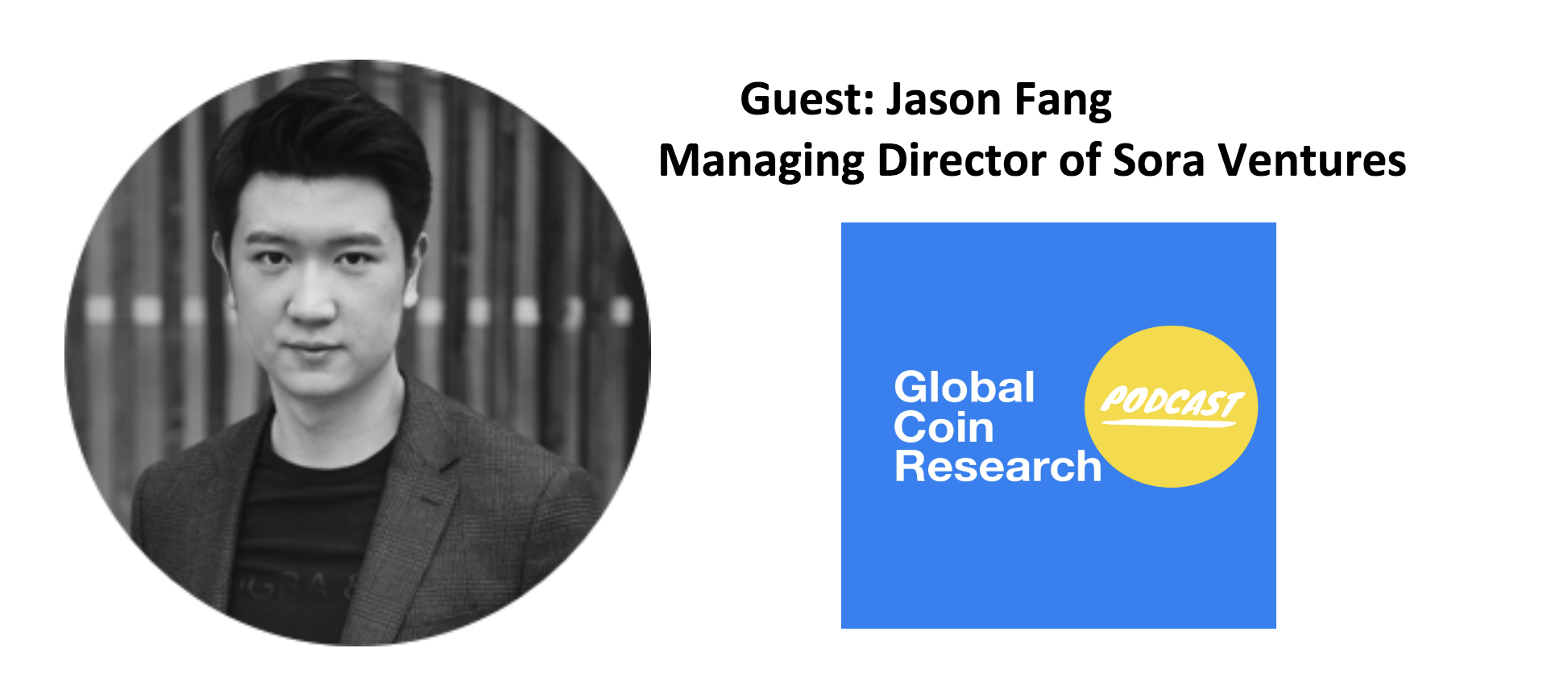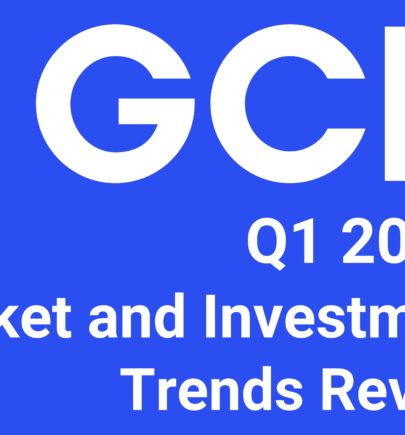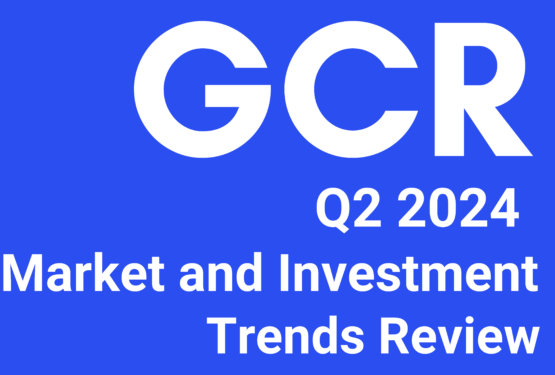Interview with Jason Fang of Sora Ventures on the Firm’s Unique Investing Approach, Investing in US and Asia

In this new episode, Joyce Yang from Global Coin Research is joined by Jason Fang, Managing Partner at Sora Ventures, an Asia-based venture capital firm focused on blockchain and crypto investments. The mission of the fund to invest in entrepreneurs who can make positive changes in our world using blockchain technology. Their investments include Thunder, Urbit, Mithril, Alphaslot and more.
Jason was one of the earliest employees at Fenbushi Capital and started Sora Ventures when Mainland China banned ICOs in 2017. When I initially spoke to Jason, I’ve found him to be very thoughtful and his investing approach to be very unique amongst crypto investors that I’ve met. In our conversation, we talk about how Sora invests in crypto projects, Jason’s outlook for the crypto space, and his perspectives on crypto developments in the East and the West.
Time and Topics discussed in Our Interview
1:24- Introduction to Jason, Sora Venture, and his background
3:59- how did Sora Ventures get started after China banned ICOs
6:09- why Sora doesn’t invest in Chinese projects despite being headquartered in Shanghai, China
7:55- how Sora think about investing in the blockchain and crypto space
19:46- why do you like the reverse-ICOs model?
21:34- metrics to benchmark the success of reverse-ICOs
22:54- is the blockchain space between Asia and the West going to merge?
28:41- Checkout the upcoming Sora Summit on Nov 13–14th, use SORAMEDIA2018 to get 80% off to tickets
33:06- Current fund environment in Asia and how many funds have stopped investing in crypto
34:47- Where do you see the winners coming out of in Crypto?
35:20- Practical approaches to thoughtful investing
You can also read Jason’s thoughts on his medium articles here, in where he lays out Sora’s investment thesis and his outlook on Asia:
Sora Ventures’ Philosophy to Blockchain Investments
Understanding Chinese Crypto Investors
PODCAST TRANSCRIPT
Joyce Yang
Welcome to the Global Coin Podcast. A Podcast where we hear from leading global operators and investors in crypto with their thoughts on the Asia Blockchain and cryptocurrency space. Asia is really a cryptocurrency hub, and understanding the region is as important as understanding what’s going on locally. We also have a newsletter that highlights all the important crypto news coming out of Asia with many translated by our staff directly from the local media. Check it out at [globalcoinresearch.com]
I’m your host Joyce Yang, and I’m joined today by Jason Fang, Managing Partner of Sora Ventures; the Asian based venture capital firm focused on Blockchain and crypto investments. Jason was one of the earliest employees and Fenbushi capital, and started Sora Ventures when mainland China banned ICOS in 2017. The mission of the fund is to invest in entrepreneurs to make positive changes in our world using Blockchain technology. When I initially spoke to Jason, I found him to be very thoughtful and his investing approach, and very unique among crypto investors I have met. In our conversation, we talk about how Sora invests in crypto projects, Jason’s outlook for the crypto space and his perspectives on crypto developments in the East and the West. Jason welcome. Would you please introduce yourself to our listeners?
Jason Fang
My name is Jason Fang, I’m the Managing Partner of Sora Ventures. Sora Ventures is institutionally funded and targets cryptocurrency and digital asset investments. We primarily are based in Asia; I say that because we have people in Asia and Korea and Taipei and Hong Kong. I fly most of the time so kind of hard to find me, we are primarily investing in the Asian ecosystem. We do invest in the U.S, most of the them are more scalability and protocol investments. Our resources and key kind of investments are in Asia.
Joyce Yang
And then just a little bit about your background and how you got into crypto.
Jason Fang
So it’s just like a lot of early Bitcoin and Blockchain entrepreneurs. I guess, they all got into this space because of some form of engineering or coding background. So I used to be an iOS developer before I join the industry on a professional level. And then I join Fenbushi capital which is a VC fund based and Shanghai that only invest in Blockchain equity companies and crypto today. But back then when I joined, it was purely a blocking equity and firm investments; I was kind of their guy for the US market.
And then in last year of April, I joined a portfolio company called Juzhen Financials. They’re kind of like the R3 of China, where they’re targeting very similar clients, so these are traditional banks, traditional exchanges, traditional clearing houses, they’re based in China and they focus more on what we call the distributed ledger technology and something called Multi-Party Computation, which is basically encryption and security. And I was there about 4 months, and then so China banned ICO and that’s when I decided to start Sora Ventures.
The logic behind Sora Ventures was because before the banned on ICO, there wasn’t really a fine line between like what is black and what was white. And then after the ban, it became very clear to us what we could do what we couldn’t do. And then that was a good first step I think, when we see some form of regulation in China. That meant that we were able to start to finally use some form of compliance, legitimate third parties coming in. And a big part of this includes fund admin, financial auditors. When I started Sora Ventures, it was extremely hard to find legitimate third parties that were able to assist with the nature of the things we’re investing. Nowadays, is a lot more common, I think that’s a big part of that because there’s a clear kind of regulation and different jurisdictions.
Joyce Yang
Yes, I definitely want to get to that, on your views on Asia and of the regulations there. And I thought it was very interesting when we said that you know, after the ban, it became very clear to you what is allowed and what is not, and that really propelled Sora Ventures to be formed versus you know, I think others who may seem the ban and they immediately feel very turned away and discouraged. How did you guys kind of navigate through that?
Jason Fang
Before the ban, I was still very much investing on a personal level and I think at that time it was very obvious that there was a bubble including you know whether we’re in US and China; especially in China, like a lot of the US companies came to China to fundraise, and obviously they were what we call ICO platforms, the retail investor just go to put their money into these ICO platforms and they would basically be able to buy in the public sale. This actually attracted a lot of traditional money, basically family office money or institutional money and high-net-worth individuals that were not from our space, but realistically there wasn’t really any form of regulation or insurance behind this, so basically the platform they run away with all the money, they could basically do that and government can’t do anything about it. And that made it very dangerous for these traditional investors to invest on these platforms.
So when we started Sora Ventures, we wanted to basically form a legitimate structure that, a legitimate fund that has these third parties that would make this fund legit and basically enable a lot of these third parties like fund auditors to be on board. And therefore there are investors, family offices, high net worth, all of these traditional non-crypto investors will feel more comfortable investing.
Joyce Yang
That’s very helpful and it sounds like you know with more restrictions now, should we anticipate more institutional and kind of larger family funds to come in?
Jason Fang
Yeah, for sure. I mean, obviously the market is not doing too well and so people are still kind of watching, speculating, but I think overall we have seen a huge improvement and different jurisdictions in terms of compliance of regulation. I think there’s a lot more kind of like fine lines of what we could and we cannot do, and this is basically an improvement of the industry. And I think this is obvious in the short term, it is affecting certain prices on a secondary market, but in a long term I think this is very healthy. This is very helpful, and obviously is very much needed for an industry to become more of a massive what we call you know, for the average person to invest.
Joyce Yang
Yes, I agree as well it’s definitely kind of a nice time where you know I’ve seen projects being heads down and rebuilding you know, despite the market being at lows. So I thought it was very interesting when you mentioned before the podcast that you are based in Shanghai but you guys don’t invest in Chinese projects. And I want to hear you out more on that and also what else are you looking at in the region, and then you know outside of Asia as well?
Jason Fang
Right, so just to be clear we are crypto funds, so we don’t hold any fiat. And that enables us to basically invest and they say any jurisdiction that accepts cryptocurrency…. And that basically means that we’re not restricted to investing in only Chinese companies. If you’re raising an RMB fund, a lot of times you’re basically restricted to investing in companies registered in China.
So that enables basically for us to invest in a lot of companies around the globe. Now, I’m not saying that you know like we’re not going to invest in anything in the future, but at this point we haven’t made a single investment in China, and the reason for that is because when you’re comparing a lot of these protocol investments in China and the US, I think the ones the US are more attractive in terms of technology, in terms of the team, in terms of the ability to build communities from day one, whereas it’s going to be very tough for a lot of these protocols; or they claim to be protocols based in China, and they’re trying to build these communities but there’s regulation, the compliance issue, government will step in. If the protocol actually becomes very successful, the government will definitely step in. If it can’t become successful and it doesn’t really work out like you know, it’s going to be over. So it’s not going to catch a lot of attention from the government unless it’s like illegal fundraising, but I think one of the big parts of our investment thesis is we got to have a community, where the larger the community, the lower the investment risk for us. And so that’s why in comparing that in the US and China, I think the ones outside China are more attractive.
Joyce Yang
Can you just elaborate a little bit more on that?
Jason Fang
So basically our investment hypothesis is the larger your community, the lower the investment risks. The more people holding your token, the lower the risk.
Joyce Yang
And yeah, let’s talk about that because I think that your philosophy towards investing crypto is also very unique. If you could just give our listeners on a high level how you guys approach your crypto investments and you know, kind of walk us through the thoughts there.
Jason Fang
Yeah, so you try to understand like the very basic level, the fundamental level of how a protocol would succeed. It’s really based on the developer right. So if you have a very large development like the developer community and whatever protocol you’re building then the likelihood of you building a dApp it’s much higher than anyone else. When you have dApp, then you have the opportunity for basically your technology, your infrastructure to interact with consumer level, with consumer or enterprise; so that’s this is the logic behind investing into the protocols.
But because like I said in China is this is very tough to market, to do any form of marketing or PR on protocol, and is it very very difficult for them to attract developers or any form of interest from the community from day one. So for us especially the bear market right now, I think we got to be very rational about where else can you actually get these…. Where else can you get this community or token holders. And one of the things we invest in is we do what’s called reverse ICO which is basically you have an equity company and then you launch a token as a strategy for your equity company. So example of that as we invest into Mithril. Basically that company Mithril is led by the Chairman of M17, which is one of the largest software companies in Taiwan, and if you took a look at Chinese market, we move to the Chinese market because we assume that they cannot do the same reverse ICO, then they’re probably number one in terms of live streaming. And I say I am basically referring to that from kind of an App Annie and a lot of the ranking on Apple Store. So for live streaming, they’re number one in Hong Kong, number one in Japan, number one in Taiwan. And they’re relatively high in other places in Asia but their dominant market is in those three places. And what happens as opposed to launching a protocol or a what we call a very high valuation protocol, they’re basically starting something with more focus on the Blockchain enterprise, more of a dApp.
But again, the dApp is kind of misleading because when people refer to dApp, they’re referring to something that’s like 100 percent decentralized. We’re not trying to say that it’s 100 percent decentralized, we’re just saying that hey, we’re going to use 20% or 30% elements of blockchain technology and the rest is centralized. Obviously, that’s going to mean that a lot of libertarians or people who truly believe in centralized technology; those people will not invest or wouldn’t be interested in this project, but what we think that it’s most needed for industry at this point is adoption. Its people like traditional people; whether it is through investment, whether through use case, we need more people holding basically some form of token or have some form of interest in these token projects. Otherwise, your community will basically eventually die to zero. And I think the point here is, the traditional way of attracting people into our industry is through what we call protocols and protocols attract developers. But in the case where we’re working with a reverse ICO where it’s actually less of about the protocol and is more about the technology, about the use case, about the adoption, then you have a case that you’re actually attracting users from the existing equity company or users from extending resource that the CEO or the chairman has. And that’s a totally different level what we call… that’s a totally different strategy, and that’s still attracting people into your community. If people are holding more of your token, then the amount and the address goes up on your smart contract, and that’s for us is the same effect, but I think this is a much faster way of seeing some formal adoption through protocol investments.
Joyce Yang
Got you. So what are your thoughts on investing in decentralized projects?
Jason Fang
So basically, it works like this. As we have two investment thesis; one, as we invest in adoption, which is a lot of time, as projects we incubate in Asia. Those are the ones that are like Mithril, which was started by the one by th -chairman of M17 and Alpha Slot, which is by the equity company called Takara gaming group, which is a slot machine provider for the casinos in Asia. And these are more adoption; we believe that investing in them will bring more people to our ecosystem and by doing so, we’re able to get a larger population into the crypto space, into the blockchain space.
Now whether this is going to be just for Alpha Slot or just for Mithril, I think this is only step one. I think once you educate people on what they’re doing, and what the tokens are, they’ll slowly try to look at Bitcoin, they’ll start to look at Ethereum, I think in the end it’s a win-win situation for everyone. But we’re just starting from what we think is kind of a low hanging fruit and that’s why we’re investing in these companies.
The second part of our investment is investing in infrastructure. here So they’re basically like scalability projects, things that are more technical, but it’s also needed in our industry. So you can look at this. It’s like if we’re trying to bring this into a most logical way, I probably see this, we’re investing into infrastructure like a bridge that’s cross an island, and there were investing into people. So people who will know that there’s a bridge there that…. So even if you… right now I think even in the US for example, I think investors are investing too much on the infrastructure side, whereas realistically, I think our market is going down because there are not enough users, there’s not enough people in our industry. Like recently, I heard exchanges are… their DAU is only about 5k to 10k, which is shocking because their valuation is crazy, but their product is only used by 5k to 10k people. Same thing for media, the same thing for wallet, same thing for.… You can see that because the market is going down, there are just less people interested in crypto, in Blockchain, and as the fund that we’re all in on this industry. I think you got to be practical and how you invest and how you position yourself. And I think infrastructure is important, but I don’t think you should put everything in infrastructure. I think you should still put some of your investment into adoption and that’s what we’re doing.
Joyce Yang
Do you expect returns to be different from adoption and infrastructure type of investments?
Jason Fang
For sure, for sure. So I think something like infrastructure; your roof is much higher, whereas with the adoption play, the roof is much lower. What I mean by that is for example because the infrastructure you’re building with adoption, it doesn’t take much time. It’s 20% or 30% blockchain, which means that you can build the product quite easily, quite fast. Which means that you’re basically just having what we call tokens integrated into your existing product. So people can use it and people can see it. But with our new form of technology, if you want to have some form of destruction, or what we call change a lot of the existing technology, then that requires a lot more infrastructure play. So infrastructure will take a long time to build. I think it’ll probably take 2-3 years or even longer to at least to finally see some form of consumer level use case. But with the adoption level, you’ll see that a much sooner like probably less than 1 year and we’re actually slowly seeing that with some of our investments in Asia.
Joyce Yang
And then, the infrastructure; if you want to be specific, you’re talking about on the protocol level as well as the development cycle.
Jason Fang
Yeah exactly. Yeah exactly. So like protocol, and then scalability, this layer two and then when you have a stronger, more robust layer too, a more robust infrastructure that enables developers to build on top of it. But this process is much longer, you got to be more patient, it’s more costly too, but if it does succeed, I think it’s going to be a roof of returns for returns. I think the roof will be much higher.
Joyce Yang
Yeah got you. And then your view is that it still takes some time for the infrastructure players to solidify and build out their products, and only then do we think that decentralized players could integrate maybe 20 to 30 percent of the technology from the centralized players, or are you expecting that to happen simultaneously?
Jason Fang
Okay so basically, we don’t want to put our eggs in one basket. So then that’s why we have 2 strategies, but I do think the one with adoption that has 20-30% Blockchain technology and the rest is centralized, I do think that is a much more practical approach at this point, especially I think after working for a Blockchain company that focused primarily in Blockchain technology. I think a lot of the use case end up being something around that ratio. I mean at this point; our industry is going…. I think a lot of price, a lot of people are slowly leaving this because… they’re fed up with the bubble. And a lot of the story that people end up saying or end up promising is not being delivered. And I think as investors, you got to be very clear on what you’re investing in, and I think having some form of risk management is needed; it complements with I think a lot of…. For long term investment, you got to have slightly short-term investments as well because those are ones that are going to be more immediate because we’re more of a GP/LP structure. In general, I think our industry needs to see a product, something that’s more tangible. I think this is the right direction to go.
Joyce Yang
I’m almost seeing it as that you guys are acting also as a key player where you are going into the company, helping them grow adoption, and really you know, experts on the marketing and consumer side versus the protocol of investments are more kind of PE play.
Jason Fang
Yeah I mean, we’re not trying to say that we’re doing a reverse ICO, where we’re valuing the protocol or the technology with the same valuation of the equity company. I think that’s a wrong way to approach at this. I think the idea here is to build a product that is-
Number 1; on the same path as like trying to do something that’s real, that’s tangible, that consumers can use.
Number 2; as attractive not only for investors like ourselves like primary investors, VC, but hopefully also hedge funds. Because a lot of hedge funds are the main drivers for a secondary market right now.
Joyce Yang
Yeah, and I remember before when we spoke, you mentioned this really interesting question that made me think after a while and now I’m still thinking about it a lot and that is “is Blockchain a strategy or technology?”
Jason Fang
Yeah
Joyce Yang
If you could just elaborate on that because I think is related to how you guys are investing as well.
Jason Fang
For me, I still define Blockchain as…. At least in Asia, I think the Blockchain is…. In my dictionary, I think Blockchain is defined as more of a strategy than technology. Whereas in the U.S, I think a lot of people will see it as more of disruptive technology. I think it’s likely works both ways, but at least for our fund in my opinion, I think for fund especially understanding the consumer behavior and understanding where a lot of this money are being invested.
I think in the end, I think Blockchain is a strategy. And the reason for that is because it’s hard to sell Blockchain by itself. We’re doing right now, but it’s not something that you can see as a consumer’s perspective. It’s not something that you can see immediately, it’ll probably take 5-10 years, it’s still a question mark. We don’t know what it is. The whole point is a question mark, because you approach this from a strategy which means that it’s very much like you have the main branch of your technology, you have the primary business, and then you can choose between AI machine learning, Blockchain. And these are things that would support your primary business, then that’s how we define Blockchain as a strategy.
So for example, with Alpha Slot for example, their primary product is not the Blockchain, their primary product is the slot machine, they build slot machines for casinos. They’re utilizing elements of Blockchain including the permission of Blockchain and the smart contract and the tokens to improve them, improve the user experience, to improve their existing product. So these are things that I think a lot of companies including IBM, that’s what they’re doing. A lot of enterprises are focusing on practical Blockchain use cases that would improve a lot of their business logistics.
Joyce Yang
Yeah, like for their customers right?
Jason Fang
Exactly. And that’s what we’ve been investing from day 1 of Sora, but the problem with our industry I think that they got bubble up was because people started investing. Sort of started selling themselves with Blockchain, which it basically means like you’re just selling a dish before the restaurant is built, and you really don’t know when the restaurant will be built.
The story is that you will sell some form of dish to them, but we have no timeline or we have no idea when that dish is going to be delivered. That’s a rational way to look at investments especially if you’re trying to utilize some form of new technology in existing businesses. So that’s why I think at least in Asia, we think that using Blockchain as a strategy is more important, whereas I do understand that in the U.S, people do feel that the Blockchain is just by itself, if it does work out with strong community with enough cash flow, it would become a product of its own.
Joyce Yang
Why do you direct your adoption to existing companies in the examples such as pre reverse ICO’s?
Jason Fang
We like to reverse-ICO model because we think that’s something that’s practical, we think that’s something that we can see it immediately which is less than 1 year.
The most important part is this, to begin with, there’s not a lot of GP/LP funds in China, in Asia. Most funds in China and Asia, they’re all their own money that they made from 9 months ago, like from the bubble. So you can do whatever; it is your own money, you can do whatever you want. You can invest in things that make money, which should have a lot of investment in this. But if you’re starting a VC, like a legitimate VC fund with investment thesis when you have GC/LP on board, that’s a totally different story. You can’t just invest in things that make money because that’s not enough you know, as a VC fund, you have to invest in things that are of value-add to the ecosystem. Like you know, we have an investor that asked us that “hey if you have like a 100k Bitcoin, where will you invest.” And I think a lot of people would say “if I had a 100k Bitcoin, I will try to make more Bitcoin.” But the response I think is that the most straightforward response, but I think if the price of bitcoin is always dropping, then realistically, the more Bitcoin you make, it’s going to be in the same position where what we’re seeing right now, which is Bitcoin is not worth that much or Ethereum is not worth as much. And it’s going to come to a point where the ability to produce the amount of a Bitcoin or Ether is not sustainable and then you’re going to hit a point where you start losing money. So I think the whole point is that you have to invest in things that make sense, that is profitable, but more importantly, you have to invest in things that are value add to the ecosystem so that whatever you bet in, whether it’s Bitcoin, whether it’s Ethereum, whether it’s Ripple, whether it is your EOS, your ecosystem grows. And there’s the ability for people to come in, that’s why we were investing into these infrastructures. And when more people come in and there’s a larger community, with a larger community, there is basically more people with your token, then your investment will go up.
Joyce Yang
Yes, and I’m not sure this is too early, but would there be any kind metrics you’d be willing to share from the companies that you’ve invested in on the returns, rather the type of effects that they’re seeing from these reverse ICO’s?
Jason Fang
Yeah.
Joyce Yang
I’m not even sure how do you look at it.
Jason Fang
The best way to look at this is through Coin Market Cap. It’s like we incubated. So far, we’ve incubated 1 project that’s listed, and we only do 1 every 6 months. So the first one we did was Mithril, and their top 60 on CMC right now. So if you look at just like the 2008 companies, there’s not a lot to begin with, there’s not a lot of company that was incubated by the VC fund and hit top 60. So in the end, I think making money is great, but more importantly I think you have to be practical with one of your investments, and obviously some people will disagree with my investment thesis because they believe that everything in this industry should be fully decentralized or at least this should be like more of a majority as opposed to a minority. But my view is if you don’t invest in things that would add you know, that would get consumer or adoption into your ecosystem, then even building the best bridge or best-looking bridge or the fastest bridge, that will equal to zero, because no one knows about this bridge, no one knows it exists, no one knows about how to go to this bridge. So these are things that I think we’re betting on. You have to understand that the US investors are heavily invested in infrastructure, and we’re investing heavily into adoption.
Joyce Yang
Yeah definitely; an idea kind of huge discrepancy between the two regions. And I wonder if it’s going to converge or in the year, Blockchain would mean completely different things in Asia versus U.S.
Jason Fang
I think it would eventually converge, because if you look at a history of Bitcoin, everyone who got into Altcoin initially, they all got through Bitcoin; they all found Blockchain, they all found some other cryptocurrency because of bitcoin. So we’re doing the same effect where the first initial miners in bitcoin, they didn’t even know what bitcoin can be used for until they made a first transaction with the pizza. And I think what’s going to happen is our portfolio companies though, they have these products that would instantly directly interact with consumers who never touch a Blockchain before, and they wouldn’t even know that they have some form of Blockchain technology behind it, and that’s the key. It is to interact with the products before most even understand there’s any form of Blockchain technology behind it. But sometime down the road, you’ll realize that oh, here’s something, this credit or this token could be used for something else.
And I think this is kind of like very interesting; I think I heard a video from I think it was from USV or something; I’ve forgotten, but the speaker mentioned something that’s really interesting, which is all technology, like it always starts off with poor scalability, poor security, poor everything, but then there’s this one thing that makes it shine, in Blockchain, its trust.
So just like the iPhone, I think he mentioned with the iPhone which is initially, the iPhone had certain things that didn’t really… that was same like in a previous phone, but it had a camera, it had the ability for people to build the apps on it and now it’s like most people invest more into building this than we have a more business… a more like a computer full PC. So these are things that it will be similar in Blockchain, like we’re investing into a lot of adoption because we believe that somehow somewhere, somehow, these people that we invest in, these communities from our side will end up touching Bitcoin and then from Bitcoin, they’ll end up touching certain other tokens or other projects. And I think that’s going to happen quite quickly, I just think that in addition to investing into infrastructure, you got to invest in people, you have to invest in community, you have to invest in adoption.
Joyce Yang
In your investment approach, you guys are also very… I know you’ve alluded to it before. You also taken a very unique way which is that you incubate a company every 6 months and you invest in the few companies that you find should be promising investments.
Jason Fang
It’s interesting because I think it’s not like there’s not that many great companies out there. I’m sure there’s tons of great companies out there. It’s just that I think the amount of trust between the investment firm and the project. And what I mean by that is, we’re seeing a lot of reverse ICO, we’re seeing a lot of projects that try to like copy and they may make the same model.
And I think the key here is number 1; you don’t want to do a reverse ICO where you have a crazy valuation. Because that doesn’t make sense from our market like in the secondary market. Like how would you perform well in the secondary market if the market is going down and you have like over a like a $400 million valuation; it just doesn’t make sense. And then specifically, I’m referring to reverse ICO here, and the second part is you don’t want to start entirely new product. What I mean by that is, you have at least, you have these series C, series D company who would start, who does a reverse ICO and they start a chain, they started protocol. And I scratch my head and ask myself like “why are you doing that?” Because that sounds like a pivot to me. You have the same team basically building another new product and people who understand how hard is to build protocol would probably understand, will probably feel like “oh my God, it’s a slap in the face.” It’s like the product is already hard enough to build and now you’re pretty building something that is so low level. This is like infrastructure based, this is like the TCP/IP. And then assuming you’re able to build that, you got to build a community, you got to build a development community. So this is a pivot in my opinion and I don’t think that’s a smart way to approach reverse ICO.
And then what’s smart is you do a reverse ICO and you launch the token past the strategy. So you’re not doing any new product here, you’re still building whatever that primary product is, you’re just adding innovation to it. Because technology either, any form of new technology I think is two things. Either it replaces old technology or improve the existing technology. In this case, you’re improving it and for that reason, it’s a lot more practical for these companies, like existing Series C, D or B companies to use Blockchain technology.
Joyce Yang
And how do you help them grow their communities and kind of adopt them after that?
Jason Fang
So we have a few things just like if you’re trying to get your kid into Harvard, you don’t start when there’s like half way through high school. You start before the baby is even born. So we are…. Alpha Slot actually, we went through a lot of meetings before we decided we want to do the project together, but we started doing this and the planning for Alpha Slot was in February, and this is when we started Mithril, and then they saw how we did the marketing and development for Mithril; the strategies and everything.
We tried to deliver this as transparent as it is to them, so it’s more of an educational phase. After they see the use case in Mithril, we start to work together on the Alpha Slot project. So we did a bunch of things; we have the venture side which became an open-ended fund and then we have a foundation. And this is quite unique to our fund strategy. We have foundation to focus on in-house Blockchain development, conference, and community development. And what that means is we actually have partners that…. Anyone in our community has these players, that are partners that we work with. So it’s not like we hire them, it’s more like we give them. We will be launching our own token and we’ll be giving tokens and incentive; it’s more of a partnership. So we have a few developers that we work with that work in terms of building a lot of the logic and the white paper and the product of integrating blockchain into existing product with the team; we have that part. As I mentioned, we will be launching a token; the start-up token, and that’s purely for community development. It’s not like a tradable token, it’s actually a non-tradable token. So the token can be used in 2 things; it can be a medium exchange or it could be IP. In our case it’s IP. So we didn’t go through any form of fundraising, we’re just launching this, we’re giving out free tokens. And then of course we have conference, and we’re hosting a conference on November 13 or 14 in Macau; the Sora summit, which is on [sorasummit.com], and we have about 50 plus confirmed speakers at this point, but you’ll also realize that we’re in Macau because Macau is like the Asia’s Vegas; it’s really for Alpha Slot. We design a lot of these big events for our incubated projects, but we design it way ahead of time. But at same time, we are using this as more of a platform for us to make friends, to come together and basically see where the future investments will be in our industry. As a VC fund, it is important for us to do conferences every time and every now and then because Blockchain is so heavily dependent on people, on community. And conferences enabled that opportunity for community to interact, for your friends and partners to interact, to come together and build a stronger relationship. And obviously, we’re doing that for a portfolio company as well.
Joyce Yang
Yeah I agree with that as well. I think that conferences are a great way to get people together talking.
Jason Fang
Yeah most like conferences we’ve got in now are just like parties or reunions, but I think at least for us we have very big emphasis on showing a product that we think is tangible and that will be very disruptive in the gaming industry.
Joyce Yang
Got you. And the Sora summit will be in November 13th and 14th in Macau.
Jason Fang
Yes, exactly. We’re hosting in Macau because you can’t put a slot machine in Hong Kong or in China. That’s the only place you can put it, so there will be a bit of traveling but I’m sure it’s going to be worth it for the audience.
Joyce Yang
Yeah, I think it’s definitely worth checking out if no one has, because Macau makes Vegas look like a dwarfs Vegas in comparison.
Jason Fang
Yeah. We are offering a lot of discount to community partners and to people who are generally interested in coming. Our price actually is presently very high, but the reason for that is because we don’t want random people just show up in the conference. So there are people who listen to this podcast who are interested in the conference and would like to show up. We’ll be more than happy to give you a discount to a conference.
Joyce Yang
Yeah, how do they contact you or can reach out to the conference?
Jason Fang
A few ways, we obviously have an email that if you just go to our website; Sora VC or [soarsummit.com], you can just email us and be like “hey, I heard a podcast and this is what I do and I’m super interested. Is there any way I can get a free ticket or a discount ticket?” And we’ll be happy to offer that. I think in the end; we want to be as much as inclusive as possible but at the same time we want to keep the quality of the people coming in to be quite high.
Joyce Yang
Yeah for sure. That’s good to know and I’ll make sure to make it in my podcast description below once we release this. I want to wrap up by asking some of the kind of high-level market questions that you’re seeing of what going on in Asia as well as the US. What’s your thoughts on the market right now?
Jason Fang
I mean the market right now is you just need to focus more on adoption. I think there’s really not that many funds that focus on adoption right now. We’re seeing a huge decline in users, in communities. And that includes before exchanges wallets, people who view these news outlets as it’s declining every month, and that’s not usually the best time for us. So I think until we see some form of real adoption, were either through our investments or either through… So the logic is this; I think a lot of the investment we saw several months ago are all push factors which means that you build a product and you push it out. And nowadays, I think a lot of these products that we’re building won’t actually attract them, will attract users here.
Joyce Yang
And you are seeing across Asia as well, there’s nothing where we’re seeing increasing or maybe perhaps pretty stable adoption in Asia? For those local regions, for example, in some specific localized Crypto companies, is that the case?
Jason Fang
I can’t speak for half of the US, but at least in Asia because we do work with a lot of large players in Asia. At least in Asia, we are seeing a huge decline. I would argue that I mean, Asia itself is one of the largest market for cryptocurrency especially Korea and China. Even though the government in China banned ICO, we’re still probably one of the biggest players in the market. And to see that decline, I think either they’re you know, some people are saying you get away into a 2-3 years in terms of the next halving in Bitcoin, some people are saying until you see the next bank, more specifically people are referring to the Bitcoin ETF. But I think for our side, we can’t wait for these things to happen and hope it happens. I think for our side, our role is to make it happen and that is through what we call investments into adoption.
Joyce Yang
Also if you can give a view on what’s going on with the Asia funds overall. I’ve heard some of the funds it really has taken a big hit, but I’m wondering if you know, do you think most of these will come out unscathed?
Jason Fang
Yeah, you’ve got to understand most of the funds in Asia, its mostly their own money. So a lot of these funds especially in China have stopped investing, in general; they just don’t invest anymore. The other thing I think is more about relative. It’s not an absolute thing, so I think everyone is getting hit by the market because the market went down 80% from you know, Q1. And I think this is a matter of who’s getting hit more, who lost more money. In general, I think is a lot of these Asian funds in order to reduce the risk in crypto, they’ve either turn their crypto into USTD or is cashed out and stopped investing. Actually even in private marketing; now this and in China, it’s extremely hard to get money from funds because you’re probably safer buying the token on a secondary market than in the private market, because it’s very likely that the price would drop below the offering price.
Joyce Yang
Oh wow, that’s pretty negative.
Jason Fang
Yeah, we have seen that in a lot of Chinese projects already. So that’s actually quite common around Asia.
Joyce Yang
It sounds like people don’t assume that’s coming back up anytime soon.
Jason Fang
Yeah unless something again happened, and with the 2 things I mentioned. But assuming that it doesn’t happen any time soon. I mean the big happening is not going to happen any time soon, but if no one invested in adoption and if adoption plans are not made, then there’s really no way for these new users or new community or these new investors coming in or new money coming in, then I think you can probably assume that’s going to be flat, or even slightly decrease in the market for the next several months.
Joyce Yang
Yeah, that’s very refreshing to think about. Ending with a positive note, I want to ask you. Where do you see the winners to come out of in crypto?
Jason Fang
I think the winner will be investors that who go against the consensus. And what I mean by that is a lot of people invest into the industry because it’s a bubble, but the bubble is the consensus, basically like everyone invested in protocols, like everyone invested in this term “protocol:. Now, I think the real winner will be the people who are practical, I think the ones who are able to invest in the right entrepreneurs, basically going back to start 1 on 1, a lot of…. YC or Paul Graham mentioned about what is the proper way to do start up. I think in the end it is solving certain problems, because you solve a problem or you improve something people use it. I mean people use it in this case, then they become the token holder and becomes a token holder, then you have your risk of the investment will go down. So unless you’re able to build a product that’s actually usable, that is actually useful in general to solve certain things, whether it is in their ecosystem or outside of that ecosystem, if you can do that, I think you’ll survive, but if you can’t, then I think you’re just curious investing into… dumping your money into the ocean.
Joyce Yang
Yeah, I agree and I think that that makes a lot of sense. I think right now the market needs like the equivalent of someone like Steve Jobs of dApps. Someone who’s able to interpret and contextualize, and build something really usable.
Jason Fang
Yeah, but obviously we’re very optimistic about our investments and prefer local companies. I think that’s why we’re doing this podcast because…. And this is why I write articles on media, that’s why I speak on conferences because I still do believe there are people who understand our investment philosophy. And we’re starting to see that a lot more because the market is going down and a lot of people are scratching their head and asking why it’s going down and what have I done wrong in terms of investments. And I think people are starting to be more rational about their investments, people are starting to wake up from “ok, what do we need to do and what are the kind of the real investments here, what are the kind of the ones that we think are going to end up being quite risky.” So I think its going to go up, I’m now obviously very optimistic about the industry, I think it just requires time and education.
Joyce Yang
Yes, and what other types of companies are you looking at for your future investments or helping them with adoption and if you have any specific industries that you’re looking at, or are you guys just more opportunistic depending on the type of company and the timing of the market?
Jason Fang
Yeah, so we like large companies that I mean, in Asia, we work with… we’re still talking to a lot of large companies or what we call influencers, or people will basically have these large KOLs. So basically, they’re famous, they the credible people that want to do some fun watching project with us. And we’re always open to meeting these new entrepreneurs. I mean, if you look at our case study with Mithril, that’s a really a good example of entrepreneurs were looking for. It’s a successful use case, have been proven, it’s in the top 60, its performing well even in the bearish market. This is an entrepreneur I think that will certainly make a huge difference in our industry. I think he’ll be able to bring in a lot of new users, and he really understands this resources in market and has his team, like he really understands his market. So these are entrepreneurs that we’re looking for and of course we’re always investing into products and teams that are able to educate people like in the infrastructure or an adoption side. We’re actually looking at 2 companies that are looking to invest next month, and I’ll be happy to share some of the investments once we close it but we’re most likely going to leave the deal and these are investment companies, I think will be able to provide those 2 points that mentioned.
Joyce Yang
Sounds good. Yeah, we’ll be following and I’ll be sure to share your social media and medium accounts for the folks and kind of see what you guys are up to.
Thanks so much Jason.
To learn more about the topics discussed today, check out the descriptions under the podcast episode. Also be sure to follow us on Twitter at [globalcoinrsrch]. New episodes come out once every two weeks, so if you haven’t already done so, rate, review and subscribe on Apple podcasts. If you liked this episode, share it with your friends on Facebook, Twitter or LinkedIn. Thanks for listening.












